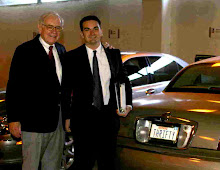Value Plays Rebuttal - Part 1
Berkshire Hathaway is unquestionably better off with Warren Buffett. I would even go so far as to say that most American businesses would be better off with Warren Buffett. He is the greatest businessman and business leader in history.
However, contrary to popular belief, many of the stocks that Berkshire buys are not necessarily Warren Buffett picks. Mr. Buffett is much more focused on the acquisition of entire businesses. The minority interests Berkshire takes in companies such as Wal-Mart, Johnson & Johnson and US Bank (and losers such as Pier 1 Imports and H&R Block), although listed on Berkshire’s consolidated statements, are most likely investments made by Lou Simpson of GEICO. Whereas other Berkshire subsidiaries send earned capital directly to the parent company, GEICO invests its own cash. Mr. Simpson has been so successful at investing GEICO’s float that historically he has been suggested to be a heir to the throne. (If only he weren’t so old.)
In his posting, Mr. Sullivan commits several errors of fact. Let me address two of them:
Tood states that “[Buffett’s] recent purchase of 10% of Burlington Northern and 15% stake in USG marked the first time this century he has taken a meaningful stake in any company.” And also that “Berkshire's investment portfolio today resembles a mutual fund with small positions in over 30 companies that are bought and sold regularly.” Neither of these statements is true and it seems Todd has forgotten that Berkshire also owns 73 businesses either outright or has a stake large enough to allow for complete consolidation on Berkshire’s financials.
To put things in perspective, Berkshire’s stake in Burlington Northern is currently worth about $3.3 billion, according to its April 2007 beneficial ownership filing. And even the now close to 40% stake in USG is worth less than $2 billion. This is relatively small compared to the acquisition of Iscar Metalworking in 2005 for $5 billion, or Berkshire’s 85% stake in Mid-American Energy, which purchased PacificCorp for $5.1 billion in 2006. The company has made several other acquisitions of comparable size, such as Shaw Industries in 2001 for $2.1 billion or Clayton Homes in 2003 for $1.7 billion. To suggest that Berkshire has not made meaningful acquisitions this century is simply not accurate.
Nor is accurate to characterize Berkshire’s investment portfolio as resembling a mutual fund of 30 companies. It is true that Berkshire has “investments” – or minority interests – in about 30 stocks, but the total market value of these stocks is only about $60 billion. For a company with balance sheet totals of $250 billion it should be clear that the company is much more than a portfolio of 30 stocks. People in the press and on blogs like to talk about the public equities Berkshire owns because they are still available for purchase to the public. Wanting to chase Berkshire’s success, these are the investments they focus on. But in reality, the company’s common stock investments represent only a small portion of the company.
Berkshire Hathaway is a conglomerate of 73 subsidiary businesses, which also happens to own a portfolio of 30 stocks.
FD: I own shares of Berkshire Hathaway.


2 Comments:
Agree with your post, but one thing I wanted to note: I am fairly sure that Wal-Mart and J&J (and possibly US Bank) are Buffett's picks, and not Simpson's. I also know that H&R Block was originally a Buffett pick until they sold it recently. Others like Pier 1 and The Gap are Simpson's.
By Max Olson, at 10 June, 2007 20:19
Max Olson, at 10 June, 2007 20:19
Hi there Andy
Love your blog some really intelligent stuff on here. Anyway, was wondering what your thoughts on Net/Nets are. I just posted a fairly long post on the subject at my new blog Vale Tudo Investing.
http://valetudoinvesting.blogspot.com/
Cheers!
By Eddie Bravo, at 13 June, 2007 03:59
Eddie Bravo, at 13 June, 2007 03:59
Post a Comment
<< Home